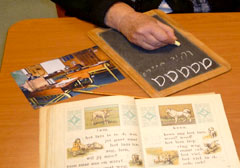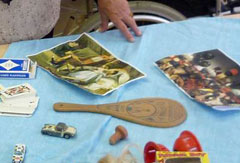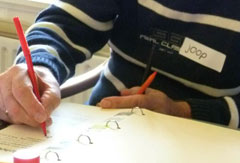Review of RTRT project: Netherlands

Memorable moments that took place in our RTRT group
-
“I felt great that I have laughed so much with my wife. My wife doesn’t laugh any longer at home anymore”
At the first meeting the caregiver said that her husband wouldn't accept it if she were to leave him alone during the separate meetings. Later, when the group did split, the husband had no trouble with the separation. He said a friendly farewell to his wife. The wife was surprised that her husband had no troubles at all. After the third meeting the couple could do also do some things separately at home. It felt good for both of them
-
“Taking care of my husband has become less burdensome and I am less afraid for the future”
At the beginning, one carer had a very negative attitude towards her husband. A couple weeks later we saw them walking together hand in hand
-
One man had a very independent relationship with his wife and didn’t speak for himself. During the “school-session” for the first time he did talk for himself while he was telling stories about his former teacher
-
A participant suddenly remembered a complete spelling lesson and taught us that. It was impressive and everybody was surprised. He was very proud of himself
-
“It was great spending so much time with my daughter during the meetings. Normally she only visits me to deliver the groceries”
A gentleman had trouble walking. He mainly sat in his wheelchair. When he did get hold of some toys of his childhood during the session, he stood up and stretched towards the ground to give a demonstration of how to use the toys
-
One couple wasn’t married yet and had just planned their real wedding date at the moment we did the “wedding-session”. We asked them to play the bride and groom. It was so special, they did their rehearsal wedding
The main things we have learned

Successes to build on:
-
 The best way to reminisce is doing things instead of only talking
The best way to reminisce is doing things instead of only talking -
Using drama, sketches and music is fun. It is also a way of making memories evident and bringing them to life
-
As a worker you have to have an open attitude and a sense of your own vulnerability
Pitfalls to avoid:
-
“I like the meetings together with my wife, but I don’t feel comfortable during the meetings when she and the other persons (carers) are not there”
It is sometimes difficult not to talk too much.
-
A meeting of two hours is very intensive for the person with dementia. It is difficult to find the right balance between doing activities and taking some rest, because if you take too much rest the meeting will feel boring.
-
It is hard to find a good location for the meetings. We discovered that a good location contributes to the atmosphere in the group.
The main things that the carers in our groups learned about reminiscence

-
That reminiscence is so much fun
-
“Communicating with my husband feels lighter somehow, now that I know better how to do it”
That they can use reminiscence in all kind of situations. Each topic can be used to reminisce
-
That reminiscence improves the relationship
-
That they can empathize better with the person with dementia through reminiscence
-
That it is not necessary to talk a lot to reminisce
-
That carers became more patient
What the people with dementia in our groups gained from the project:

-
“I don’t regret joining the group and I’m sad that our meetings have to stop”
They became more confident. That is because they could proudly show and tell the other participants about activities they were previously very competent at
-
After those sessions, they were often asked for advice by the group
-
Another reason their confidence increased was that they were asked to do and talk about things they were good at. In their daily lives, they are more often faced with their own shortcomings
-
“I am glad that it's over so I don't have to wake up so early anymore”
They became less dependent on their caregiver
-
There was lots of laughter, which resulted in a feeling of relaxation and a better mood. The mood change apparently continued after the meetings, when the person was at home






